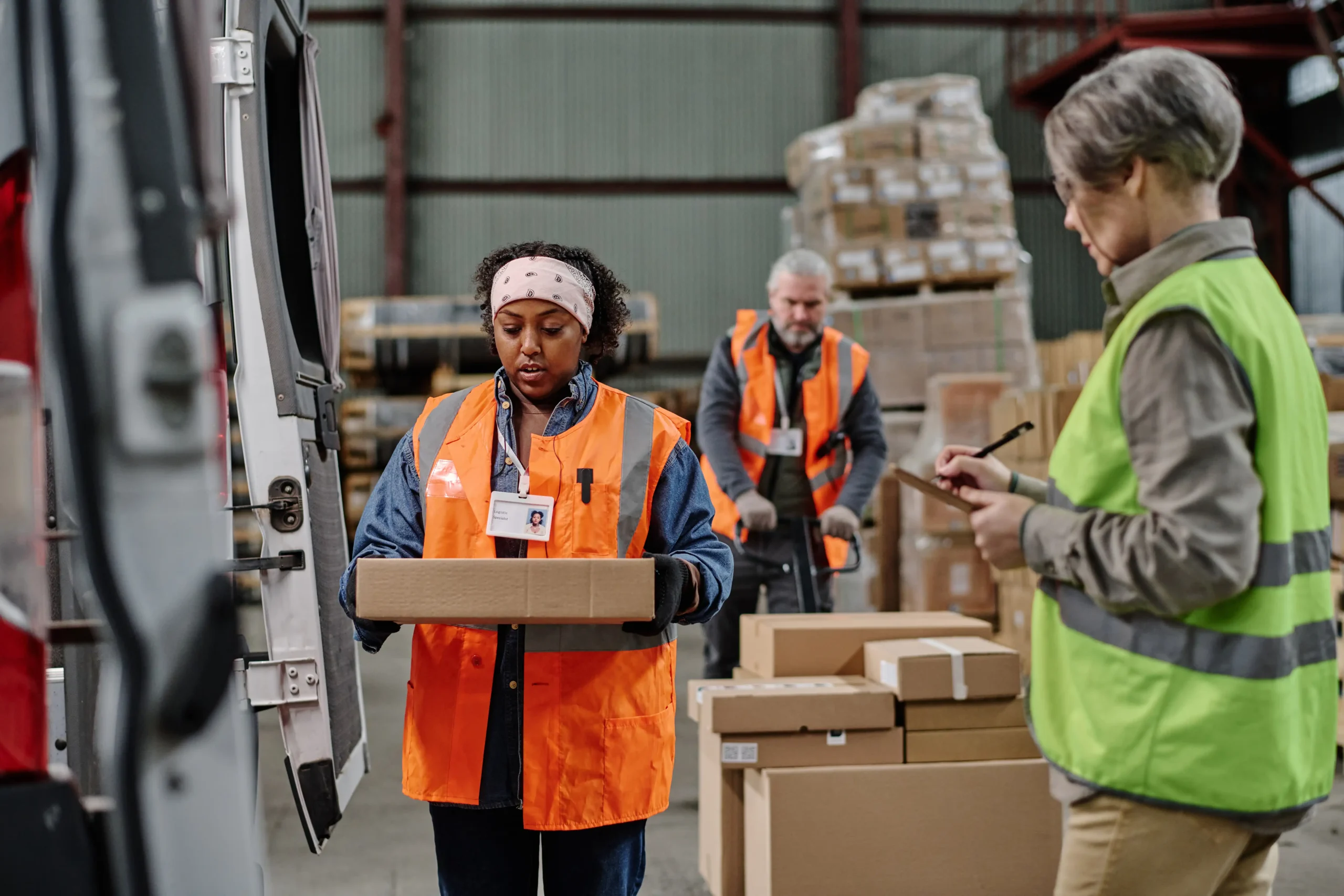Table of Contents
ToggleAs a business owner in the logistics industry for over 35 years, I can confidently say that third-party logistics (3PL) has revolutionized the way companies manage their supply chain. Simply put, 3PL refers to the outsourcing of logistics services, such as warehousing, shipping, and inventory management, to a specialized provider.
This allows businesses to focus on what they do best, while we handle the complexities of getting products to customers. At Tri-Link FTZ, we’ve seen first-hand how third-party logistics helps businesses of all sizes.
The question I often get is: how does 3PL differ from in-house logistics? The answer lies in efficiency.
When businesses manage their logistics, they take on high overhead costs—such as maintaining warehouses, hiring staff, and investing in technology. In contrast, outsourcing these tasks to a third-party logistics provider significantly reduces these costs, while also offering access to our extensive expertise in supply chain management.

The first benefit that businesses notice when they switch to a third-party logistics provider is the reduction in operational costs. Imagine having to own and operate a warehouse just to store products for short-term needs.
Not only do you have to pay for the facility, but you also need staff, equipment, and software to manage it all. With 3PL, these costs disappear because you are sharing the logistics infrastructure with other businesses, spreading out expenses.
In my experience, another huge factor is labor. Managing the workforce needed for order fulfillment, packing, and shipping can be incredibly labor-intensive.
By outsourcing to a third-party logistics provider, businesses can shift that burden to us. We handle the hiring, training, and managing of labor, which allows companies to focus their energy and resources on growth and innovation.
Efficiency also comes in the form of technology. We use cutting-edge systems to track shipments, optimize routes, and ensure orders are fulfilled accurately and on time.
In many cases, businesses that rely on in-house logistics simply don’t have the capital to invest in this level of technology. By working with a third-party logistics provider, businesses gain access to these resources without the upfront costs.
Not all businesses need the same type of 3PL services, and at Tri-Link FTZ, we understand that different industries require unique solutions. Third-party logistics is not a one-size-fits-all model.
Some businesses might only need warehousing solutions, while others might require comprehensive supply chain management. For instance, e-commerce companies often use third-party logistics providers for order fulfillment, which includes picking, packing, and shipping.
This allows them to scale quickly without worrying about warehouse space or hiring additional staff. Meanwhile, industries dealing with international trade, like the ones we serve in our Foreign Trade Zone (FTZ), rely heavily on freight forwarding services.
This includes handling customs procedures, and documentation, and ensuring compliance with international regulations. Another critical service is specialized storage.
We handle temperature-sensitive goods in our cold storage facilities, ensuring they remain at the right temperature throughout the supply chain. This service is particularly important for businesses in the food and pharmaceutical industries.
By choosing the right 3PL partner, businesses can tailor their logistics strategy to their unique needs, ensuring the most efficient and cost-effective solution.
Determining whether your business needs a third-party logistics provider often comes down to a few key factors. First, consider your current logistics challenges.
Are you struggling to keep up with seasonal demand? Are logistics costs eating into your profits?
If the answer is yes, it might be time to consider outsourcing to a third-party logistics provider. In my years of experience, I’ve noticed that businesses often wait too long before switching to 3PL.
They try to manage everything in-house until they realize they’ve reached their breaking point. The key is to assess your business needs before you hit that point.
Look at your growth projections. If your business is expanding quickly, you’ll need a logistics system that can scale with you. Additionally, consider your technological capabilities.
Do you have the systems in place to track inventory, optimize shipping routes, and process orders efficiently? If not, a third-party logistics provider like Tri-Link FTZ can provide these tools, giving you a competitive edge. Read more here.

Choosing the right third-party logistics provider is a critical decision, and it should not be taken lightly. One of the first things I recommend is ensuring that the provider has expertise in your industry.
For example, at Tri-Link FTZ, we specialize in managing Foreign Trade Zones, which is essential for businesses involved in international trade. Make sure the 3PL provider understands the specific challenges and regulations of your industry.
Another factor to consider is scalability. Your business will likely grow, and you need a logistics partner that can grow with you.
One of the advantages of working with a third-party logistics provider is the ability to scale up or down quickly, based on your business needs. Ask potential providers about their capacity for handling increased demand and whether they have flexible contracts.
Technology is also crucial. You’ll want a provider that uses advanced warehouse management systems (WMS) and transportation management systems (TMS) to keep your operations running smoothly.
These systems offer real-time tracking, inventory management, and data analytics that can significantly improve your supply chain efficiency.
One of the biggest advantages of working with a third-party logistics provider is the flexibility it provides. When demand spikes, whether during the holiday season or due to a new product launch, businesses often struggle to keep up.
A 3PL allows you to scale your operations without having to invest in additional resources. This means you can handle large fluctuations in demand without the stress of managing extra staff, equipment, or warehouse space.
I’ve seen this firsthand with many of our clients. For example, during peak seasons, we ramp up staffing and expand warehouse capacity to ensure all orders are fulfilled on time.
When the season slows down, we scale back, which helps our clients avoid unnecessary costs. This kind of flexibility is invaluable, especially in industries where demand is unpredictable.
Flexibility also comes in the form of geographic reach. With our multiple warehouse locations, we can strategically place products closer to customers, reducing shipping times and costs.
This level of scalability and flexibility is difficult, if not impossible, to achieve with in-house logistics.
While the benefits of using a third-party logistics provider are clear, there are some risks to consider. One of the most common concerns I hear from businesses is the fear of losing control over their logistics operations.
When you hand over your supply chain to a 3PL provider, it’s natural to worry that you won’t have the same level of oversight or influence over how things are run. However, this risk can be mitigated with clear communication and robust service-level agreements (SLAs).
At Tri-Link FTZ, we ensure that our clients are always kept in the loop with real-time data and regular updates. Transparency is key to maintaining trust.
Another risk involves data security. In today’s digital age, protecting sensitive information is more important than ever. When you outsource logistics to a third-party logistics provider, you’re also entrusting them with access to your data.
To mitigate this risk, it’s crucial to work with a provider that has strong cybersecurity measures in place. At Tri-Link FTZ, we use encryption and advanced security protocols to protect our client’s data, ensuring that information is safe from breaches.
There’s also the risk of over-reliance on a single provider. If a 3PL provider experiences disruptions—such as warehouse issues, shipping delays, or labor shortages—it could impact your entire supply chain.
To address this, it’s wise to diversify your logistics partners or ensure your 3PL provider has contingency plans in place for unexpected disruptions. We at Tri-Link FTZ have multiple warehouses and a network of backup carriers to ensure that operations continue smoothly, even in the face of challenges.

In my 35 years in the logistics industry, one of the most significant advancements I’ve witnessed is the role of technology in improving supply chain visibility. Third-party logistics providers are at the forefront of this technological shift.
Through the use of Warehouse Management Systems (WMS) and Transportation Management Systems (TMS), we’re able to offer real-time tracking of inventory and shipments. This level of visibility is something that in-house logistics often struggle to provide due to the high costs of implementing advanced systems.
At Tri-Link FTZ, we use GPS tracking and RFID technology to ensure that our clients can monitor their shipments from the moment they leave the warehouse to when they arrive at their destination. This not only improves efficiency but also helps businesses keep their customers informed with real-time updates on their orders.
Technology also allows us to optimize routes and reduce shipping times. With the help of data analytics, we can identify the most efficient shipping routes and adjust them in real time based on traffic, weather, or other factors.
This results in faster deliveries and reduced shipping costs for our clients. Moreover, the integration of API and EDI (Electronic Data Interchange) systems with our clients’ e-commerce platforms allows for seamless communication and order processing, enhancing the overall customer experience.
The long-term benefits of outsourcing logistics to a third-party logistics provider go beyond just immediate cost savings and efficiency. One of the most significant advantages is that it allows businesses to focus on their core competencies.
At Tri-Link FTZ, we’ve seen countless businesses thrive because they no longer have to worry about the logistical aspects of their operations. Instead, they can focus on product development, marketing, and customer engagement.
Outsourcing logistics also provides businesses with the flexibility to scale. As I mentioned earlier, this is particularly important for growing businesses.
By partnering with a third-party logistics provider, businesses can expand into new markets without the need for substantial upfront investment in infrastructure. This is especially beneficial for e-commerce companies that need to reach a global audience.
With our extensive network and expertise in international logistics, we help businesses scale effortlessly. Additionally, 3PL providers offer sustainability benefits.
At Tri-Link FTZ, we help businesses adopt eco-friendly practices by optimizing packaging, reducing waste, and using energy-efficient transportation methods. As more consumers prioritize sustainability, working with a third-party logistics provider that aligns with these values can enhance your brand’s reputation and appeal.
Lastly, outsourcing to a 3PL provider can lead to better customer satisfaction. With faster shipping times, accurate order fulfillment, and seamless returns processing, businesses can meet and exceed customer expectations.
This leads to higher customer loyalty and repeat business, which is invaluable for long-term growth. Read more here.
When it comes to logistics, the decision to work with a third-party logistics provider is one of the most strategic moves a business can make. As someone who has spent over three decades in this industry, I’ve seen firsthand how outsourcing to a 3PL can transform a business by improving efficiency, reducing costs, and providing the flexibility needed to grow.
At Tri-Link FTZ, we’ve built a reputation for delivering reliable and scalable logistics solutions that help businesses thrive in an increasingly competitive market.
If you’re looking to streamline your supply chain and take your business to the next level, now is the time to consider partnering with a third-party logistics provider. The benefits are clear: lower costs, improved scalability, and access to industry-leading technology and expertise.
Share this article
We have other resources available upon request as well as one-on-one support and personalized answers, just like our services.
Simply contact us anytime and we’ll get back to you to answer your questions and provide meaningful answers that show you how Tri-Link supports your logistics, reduces costs, and accelerates efficiency.
Tri-Link delivers exceptional FTZ and 3PL services tailored to your global trade needs.
Our solutions combine innovation, quality, and efficiency to exceed your expectations and meet your specific requirements.